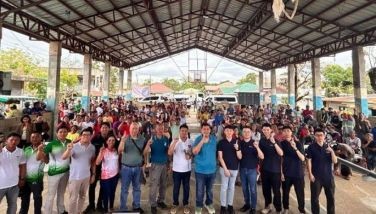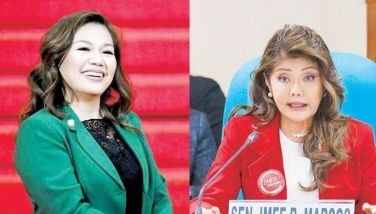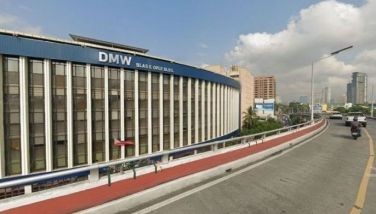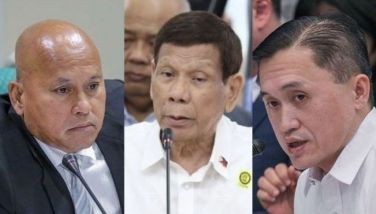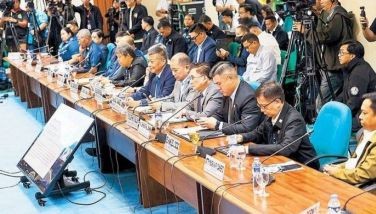Roots of our discontent

Last year on Philippine American Friendship Day, the US Ambassador then, Kristie Kenney, gave a stern warning: “The US would be concerned if the election were postponed.” It was probably the clearest indication of US interference in our internal affairs. But it was soon forgotten. The former ambassador went on a blitzkrieg-like charm offensive that had some columnists gasping in praise “what a good ambassador she was” and that “it will be hard for a new one to match her diplomatic success.” Well, it depends on how you define diplomacy.
The day of reckoning is near. We will know whether it was wise to have listened to the American ambassador to have gone ahead with the election whether or not it addressed our political concerns.
* * *
I ask friends for whom they would vote. There are those who said they were for nota, “none of the above”, but we don’t hear or read about them.
They have “disappeared” from the Philippine landscape. They keep their views among themselves less they be laughed at as “wanting to extend the term of a ‘corrupt’ President.” They are not allowed to reason, debate or object to such accusations for the sake of democratic discourse. The word has come down from Mt. Sinai.
Like everyone else they are expected to join the hoopla of Philippine-style presidential elections no matter if it is repulsive and stupid.
Think of the money wasted. The Philippine world these days is to watch helplessly as candidates spend fortunes that will enlarge the coffers of oligarch-owned newspapers and television stations to strengthen and prolong their hold on the country’s agenda.
There is a suspension of good sense when the election depends on which candidate has the biggest number of movie stars behind him. You have to be part of it no matter what. There are enough serious stuff thrown in with the garbage so you cannot complain - honesty, battle against corruption, promises.
Some are frank enough to say that if it is a choice between Noynoy and Manny Villar they would choose Villar because the former does not have a clue. As for Villar, he may have the experience but at what cost will he get things done. Indeed the theme of the election play is about two opposites of a pole - the hopelessly ignorant and the dangerously clever.
Ah, but there are alternatives — there’s the Lakas candidate, bright, good and young but he is not front-running because he is the Arroyo government’s candidate and according to this school of thought that is fatal. The American-inspired critics and oppositionists just will not allow President GMA’s influence after 2010 no matter her achievements because she has displeased them when she saved the life of a Filipino truck driver by pulling out of Iraq. That also means excluding the issue of constitutional reform from the platform of any presidential candidate.
Gibo has made a half-hearted and faint support for a “constitutional convention if people want it.” But he too is intimidated not to say more except “to review economic provisions if it is wanted by the people.” That puts constitutional reforms back to square one.
There’s Erap, the disgraced and first president convicted of plunder wanting to make a comeback. There’s the ebullient and history-conscious Gordon, who has proved his administrative mettle in Subic and Philippine Red Cross.
For the moment all other candidates are for show. In center stage is the fight between frontrunning Noynoy “the good” and Manny “the evil” so beloved of Christian fundamentalists. The Black and White Movement has succeeded in reducing our politics to what they want it to be — between black and white. Sadly we have fallen for it.
Unless, of course, Gibo sprints and breaks the “either Noynoy or Villar choice.” I am afraid that when Ms. Kenney warned that May 2010 should not be postponed or America will be displeased she meant it — never mind if the election were no different from a horse race with money and popularity. I wonder how many will look back to her warning when the race is over and the country faces the consequences.
* * *
It would be wrong to blame it all on the United States or the former American ambassador who conveyed the message for election instead of Charter change. It had its local counterpart — sections of the Church, the opposition, media and do-gooders on its side. The insidious aspect of this enterprise is the unseen and effectively unopposed forms of American control on a weak culture like the Philippines, its former colony. When an ambassador issues a warning, it rolls smoothly, obeyed without much thought, because we do not have the institutions to resist it.
The election may be based on a colonial premise but who is to argue against it? We have been separated from the wellspring of our nationalism — from our forefathers who would rather die than succumb to a second conqueror. But that was a long time ago and Filipinos like to think that we are on our own today and therefore it comes naturally to us not to challenge the word of superior America.
The truth is we ’re back where we started in our quest for independence but too few are ready to accept the challenge because it is safer to acquiesce. It may be appropriate to cite how Filipinos before us reacted to colonialist designs on the country. We need to refresh our memories again and again to know what it takes to confront colonial maneuvering. That is the only way we can understand what is happening to us today.
“The record of the Filipino revolution is one of brilliant feats of arms realized through the sterling bravery of fighting men of a virtually improvised army, almost without arms. No less notable is that after the combat, the Filipinos did not resort to excesses nor unduly press the enemy; on the contrary they returned at once to their normal and tranquil life.
But what is most remarkable in the Filipino Nation is that it continues to give proof that it knows how to frame laws in tune with the progress of the age to respect and obey them, thus demonstrating that its customs are not repugnant to progress, that it is not ambitious for power or honors, or riches aside from the rational and just aspiration for a free and independent life inspired by the most lofty idea of patriotism and national honor; and that for this aspiration and idea it has not vacillated in the sacrifice of life and fortune….” (Excerpted from the solemn declaration of Filipino independence on August 1, 1898 in Bacoor.)
- Latest
- Trending












